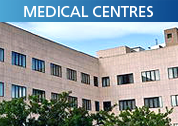
Specialized Centers
KTP Greenlight Photoselective Vaporisation of the Prostate
Green light photoselective vaporisation of the prostate (PVP) is a new, minimally invasive surgical procedure for treatment of benign enlargement of the prostate that achieves the same clinical results as transurethral resection.
Benign enlargement of the prostate consists of the development of a benign tumour, known as prostate adenoma, which grows towards and obstructs the urethra, causing symptoms when urinating.
Benefits of the operation
This procedure reduces the risk of bleeding during surgery, catherization times as well as the risk of impotence because it does not affect the nerves or blood vessels involved in an erection. There is no risk of urinary incontinence as a result of the operation, because high definition cameras are used.
This is usually an out-patient procedure. Patients do not need to be admitted to hospital and they recover more quickly.
Medical-technical description
Photoselective vaporisation of the prostate uses a very sophisticated laser that vaporises the enlarged and obstructing prostate tissue with a beam of light from a laser gun. This is a significant improvement over traditional techniques used to treat benign hyperplasia of the prostate, which involved a significant risk of complications and required hospitalisation of up to 10 days.
About the operation
You will be given an epidural and sedation before a sheath is inserted through the urethra to guide the laser fibre and brings it into contact with the prostate. The KTP laser releases laser light that vaporises the prostate tissue and within 40 to 60 minutes the abnormal tissue has been removed, opening up the urethra to allow normal urination.
Depending on the size of the prostate and your stay in Alicante, it is recommended you stay in hospital for one day and benefit from specialised professional care.
Before the operation
- A full review of your medical history to determine the details of the surgery.
- You will be seen by the anaesthetist who will explain the anaesthetic technique to be used. You must not eat or drink anything for five to six hours before your operation
- Do not wear underwear or removable dentures. You must remove all metal objects (such as rings, bracelets, earrings, body piercings, etc).
Post-operative care
- Your bladder will be washed out through a catheter that you will have to wear for at least 24 hours. This will remove any urine that may be left in the bladder.
- Six hours later you will be able to start drinking water. It is recommended you drink between two and three litres of water a day.
- You will be given painkillers if you feel any discomfort.
- You should move your feet and bend and stretch your legs to encourage blood flow.
- You will not be released until you have urinated at least once.
- The first few times you urinate this will sting a little and your urine will be pinkish. These symptoms will gradually disappear.
- When you are released you will be given a medical report with the date of your follow up visit with your doctor and a prescription of the treatment you should follow.
- The healing process takes between two and three weeks. During this time, urination can be slightly uncomfortable, although no special treatment is required.
- After you are released, you are recommended to lead a quiet life, not to take anticoagulant drugs and to keep an eye on your blood pressure.



